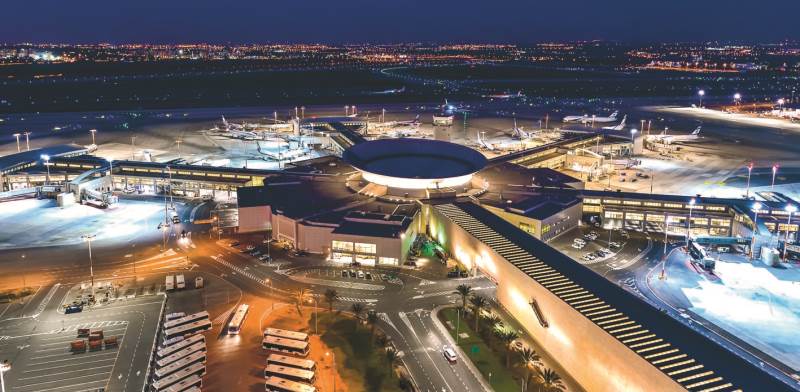
[ad_1]
In two years, Ben Gurion Airport will be disconnected from Israel Electric Corporation (IEC) (TASE: ELEC.B22) and switch to electricity produced at the Israel Airports Authority’s power station exclusively from natural gas, sources inform “Globes.” The measure will cost the Airports Authority NIS 130 million, including construction of the facility itself, the pipelines, and conversion of the power station. In the long term, however, the change will result in substantial savings on the airport’s regular operating expenses.
Under an agreement signed by the Airports Authority with SuperNG Natural Gas Distribution Company, a company that builds and operates natural gas distribution networks, all of the electricity and refrigeration needs in the airport will be supplied by the energy center on the premises, which will be upgraded and converted to natural gas. The agreement also stipulates that the airport will be connected to the natural gas distribution network, through which the gas for self-production of electricity and refrigeration will flow.
The Airports Authority’s power station currently runs on diesel fuel. Up until now, the power station was used as a backup for electricity from IEC. After the power station is converted to natural gas, the Airports Authority will have energy independence, and will no longer depend on IEC.
SuperNG, in cooperation with Shapir Engineering & Industry Ltd. (TASE:SPEN), the installation contractor, will build the infrastructure for connecting the airport to natural gas. SuperNG is the franchise holder for deploying the distribution network in Hadera and the valleys, and is also responsible for distributing natural gas in the area between Gedera and Hadera, including the greater Tel Aviv region and Ben Gurion Airport.
Switching Ben Gurion Airport to natural gas is a matter of national importance – it will significantly reduce emission of pollutants and lower electricity costs for one of Israel’s largest energy consumers. The switch is also an important element in the Ministry of National Infrastructure, Energy, and Water Resources’ project of connecting industry to natural gas. Various sources say that only a few dozen plants out of a potential of 500 plants have been connected to natural gas to date.
Switching to gas on a large scale can save the economy a lot of money and greatly reduce air pollution, but the project has been stalled for years. The State Comptroller’s most recent report on the subject states, “In addition to the difficulties encountered by the distribution companies planning and carrying out the process of deploying the distribution network, the slow pace of deploying the distribution network is also affected by a lack of economic viability for the companies in promoting the lines.”
Minister of National Infrastructures, Energy, and Water Resources Dr. Yuval Steinitz presented his ministry’s targets for 2030 a few weeks ago, which he called a “rescue plan.” The plan envisions complete termination of the use of polluting fuel (diesel, gasoline, and coal) and switching the economy to electricity production from natural gas and renewal energy sources. Another element in the plan is accelerated connection of industry to natural gas.
Converting Ben Gurion Airport to natural gas is consistent with this plan. The airport will become the distribution networks’ largest customer in Israel and an anchor consumer in the central region. In the first stage, Ben Gurion Airport will consume 16-18 million cubic meters of natural gas annually. Connecting the airport, which will take two years, involves the complicated task of crossing Highway 1 and areas outside the airport having a great deal of infrastructure, plus a long line within the airport to the energy center.
SuperNG CEO Nadav Meroz told “Globes,” “This is nationally important news of great consequence for the economy and the viability of other projects of the same scale, which will make natural gas an available and accessible energy source. Beyond the fact that the new power station will save the Airports Authority millions of shekels, the power station will reduce emissions and significantly improve environmental quality in the central region.”
Together with energy cost-cutting, the Airports Authority is preparing to enlarge and streamline Ben Gurion Airport The forecast next year is 25 million pbadengers (roundtrip traffic) next year and 310 flights a week.
The Airports Authority is in the middle of upgrading Terminal 3, including opening the fifth arm a few months ago. Like other airports around the world, the Airports Authority also plans to upgrade the check-in system, security check stations, and hand luggage checking areas. Investment in upgrading the terminal is estimated at NIS 80 million. In addition, the air-condition systems, public services, and technological systems in the airplane area will be upgraded.
Terminal 1, which handles low-cost airlines, will be upgraded. The space in the pbadenger hall will be doubled, enabling the terminal to serve three million pbadengers. Upgrading the terminal will cost NIS 150 million from the Airports Authority’s budget.
Published by Globes, Israel business news – en.globes.co.il – on November 15, 2018
© Copyright of Globes Publisher Itonut (1983) Ltd. 2018
[ad_2]
Source link